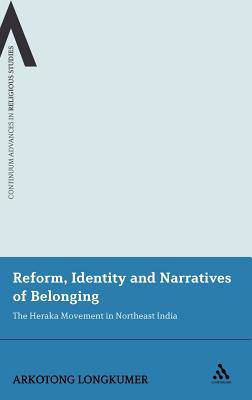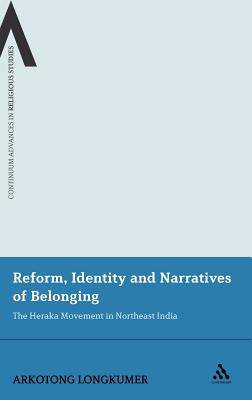
- Afhalen na 1 uur in een winkel met voorraad
- Gratis thuislevering in België vanaf € 30
- Ruim aanbod met 7 miljoen producten
- Afhalen na 1 uur in een winkel met voorraad
- Gratis thuislevering in België vanaf € 30
- Ruim aanbod met 7 miljoen producten
Zoeken
Reform, Identity and Narratives of Belonging
The Heraka Movement in Northeast India
Arkotong Longkumer
€ 339,45
+ 678 punten
Uitvoering
Omschrijving
Reform, Identity and Narratives of Belonging focuses on the Heraka, a religious reform movement, and its impact on the Zeme, a Naga tribe, in the North Cachar Hills of Assam, India. Drawing upon critical studies of 'religion', cultural/ethnic identity, and nationalism, archival research in both India and Britain, and fieldwork in Assam, the book initiates new grounds for understanding the evolving notions of 'reform' and 'identity' in the emergence of a Heraka 'religion'. Arkotong Longkumer argues that 'reform' and 'identity' are dynamically inter-related and linked to the revitalisation and negotiation of both 'tradition' legitimising indigeneity, and 'change' legitimising reform. The results have deepened, yet challenged, not only prevailing views of the Western construction of the category 'religion' but also understandings of how marginalised communities use collective historical imagination to inspire self-identification through the discourse of religion. In conclusion, this book argues for a re-evaluation of the way in which multi-religious traditions interact to reshape identities and belongings.
Specificaties
Betrokkenen
- Auteur(s):
- Uitgeverij:
Inhoud
- Aantal bladzijden:
- 274
- Taal:
- Engels
- Reeks:
- Reeksnummer:
- nr. 7
Eigenschappen
- Productcode (EAN):
- 9780826439703
- Verschijningsdatum:
- 4/05/2010
- Uitvoering:
- Hardcover
- Formaat:
- Genaaid
- Afmetingen:
- 156 mm x 234 mm
- Gewicht:
- 557 g

Alleen bij Standaard Boekhandel
+ 678 punten op je klantenkaart van Standaard Boekhandel
Beoordelingen
We publiceren alleen reviews die voldoen aan de voorwaarden voor reviews. Bekijk onze voorwaarden voor reviews.











